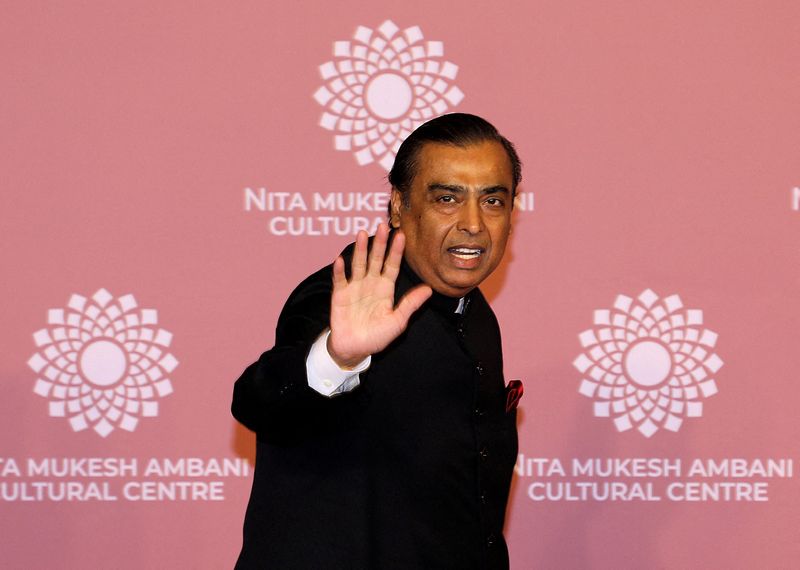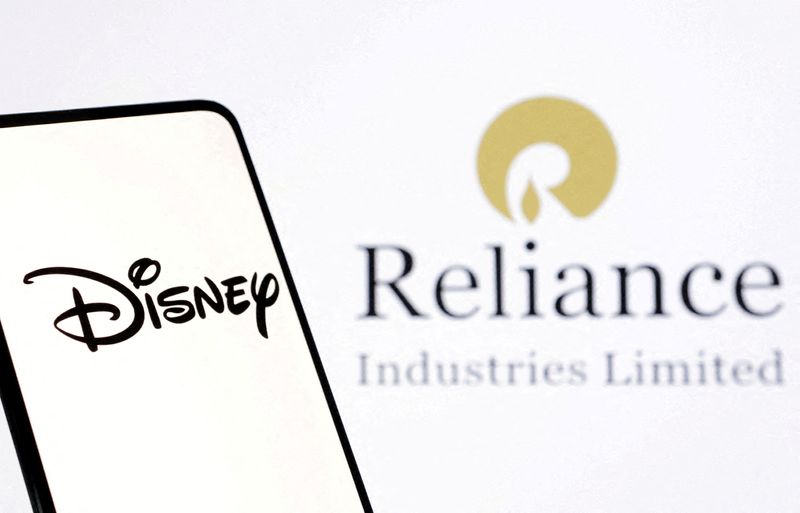By Munsif Vengattil and M. Sriram
BENGALURU (Reuters) - A Disney-Reliance assets merger in India will create a media giant far bigger than all its rivals, boosting billionaire Mukesh Ambani's entertainment ambitions with streaming tech prowess and lucrative cricket rights.
Disney and Reliance on Wednesday put a value on their joint TV and streaming assets business of $8.5 billion. Ambani's Reliance and its affiliates will own more than 63% of the merged entity, with Disney owning 37%.
The merged group, boasting 120 channels and two streaming platforms, will be India's no. 1 TV player, followed by home-grown Zee Entertainment which has 50 TV channels in India's thriving $28 billion media and entertainment market.
In streaming, Disney's Hotstar is India's largest with 38 million paid users. Netflix (NASDAQ:NFLX) and Amazon (NASDAQ:AMZN) Prime Video do not disclose their India numbers, but industry analysts estimate they have 20 million and 6.5 million paid users, respectively.
Reliance's JioCinema is largely free and doesn't disclose user numbers, having started a premium paid offering just last year.
As its rivalry with Disney grew before the merger, Reliance heavily promoted JioCinema, instantly becoming popular with its free cricket streaming offers. But it also faced user ire on social media for regular technology glitches.
"India's media industry has historically not invested much in tech innovation. Reliance will gain from the streaming and cloud-related tech innovations of Hotstar," said Shashi Shekhar Vempati, former CEO of Indian state-run broadcaster Prasar Bharati.
"Hotstar is ahead of JioCinema on many aspects of tech. It is better at making intelligent viewing recommendations based on a user's watching history and is more mature at showing live content to a very large number of concurrent viewers without glitches," he added.
A Disney source, who declined to be named because they are not authorized to speak to the press, told Reuters the company’s streaming service in India has over the years mastered a so-called server side ad insertion technology which allows them to monetize and target users on a large scale with ads during live content streaming.
Disney has around 55,000 different metric combinations - like age, location or more - to target users with ads, the source added, saying "This is all battle tested (and) Reliance can gain from this."
The Disney-Reliance deal was signed after Disney for years struggled in India, especially with its streaming business which despite being the largest could not generate profits.
On Wednesday, Disney and Reliance said they will together "offer a compelling, accessible and novel digital-focused entertainment experience." The deal is expected to close later this year or by early 2025 once regulatory approvals come in.
THE BUSINESS OF CRICKET
Disney-Reliance will also have an upper hand in cricket broadcasting - both in TV and digital.
The two companies have spent billions of dollars to purchase broadcast rights for many top tournaments including the world-famous Indian Premier League and International Cricket Council's India tournaments.
Cricket accounted for 85% of the total sports industry revenue in India during 2022, according to media agency GroupM. As Disney and Reliance combine, analysts at Jefferies estimate the group will have the "most lucrative cricketing rights" with a 40% share of the advertising market, ahead of rivals Sony (NYSE:SONY) and India's Zee.
Cricket is big business in India, with local media reports pegging TV ad rates for a 10-second slot during key cricket matches as high as $29,000. Placing a comparable ad during a football match in India costs roughly $3,000, reports say.
Indian lawyers, however, caution that the combined power of Disney-Reliance's cricket broadcasting - both in digital and TV space - could draw antitrust scrutiny.
Analysts at India's Ambit Capital said the merged entity may also have to absorb losses of up to $1.2 billion to $1.8 billion in coming years due to aggressive cricket rights bidding by companies, with other companies also having a strong foothold in digital advertising offerings.

While Disney is a big win for Ambani, Ambit said Google (NASDAQ:GOOGL) and Meta’s digital advertising strength will still be hard to challenge.
(This story has been refiled to remove the quote marks in the final paragraph to paraphrase it)
